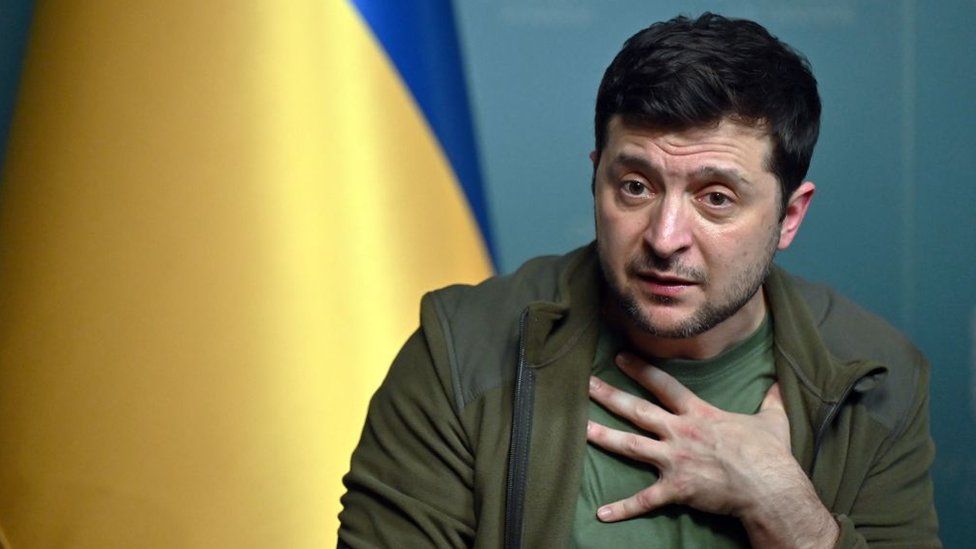
Ukraine's president has attacked Nato leaders in a fiery speech over their refusal to implement a no-fly zone around the country.
Speaking from Kyiv, Volodymyr Zelensky said the West's reluctance to intervene has given Russia "a green light" to continue bombarding towns and villages.
Nato has argued that a no-fly zone will result in confrontation with Moscow.
But Mr Zelensky said he disagrees that direct action could "provoke Russia's direct aggression against Nato".
In angry comments, he said the argument reflects the "self-hypnosis of those who are weak, under-confident inside" and that Western reservations indicated that "not everyone considers the struggle for freedom to be Europe's number one goal".
"All the people who will die starting from this day will also die because of you. Because of your weakness, because of your disunity," a furious Mr Zelensky added.
On Friday, Nato's secretary-general, Jens Stoltenberg, warned that the introduction of a no-fly zone could lead to a "full-fledged war in Europe involving many more countries and causing much more human suffering".
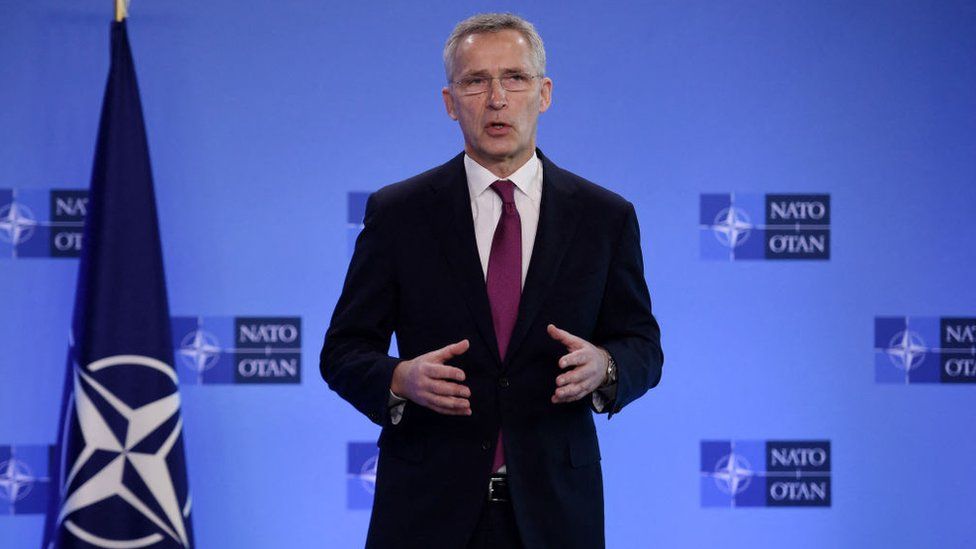
US Secretary of State Antony Blinken also ruled out the introduction of a no-fly zone, but told the BBC he is convinced Ukraine can win its war with Russia.
"I can't tell you how long this will go on," America's top diplomat said. "I can't tell you how long it will take. But the idea that Russia can subjugate to its will 45 million people who are ardently fighting for their future and their freedom, that does not involve Russia having its thumb on Ukraine, that tells you a lot."
As Russia's invasion of Ukraine enters tenth day Moscow's forces continue to heavily shell many cities.
In the south-eastern port city of Mariupol, the city's mayor has said that residents are under a "blockade" after days of "ruthless" attacks from Russian forces which has seen power and water shut off to the city's 450,00 strong population.
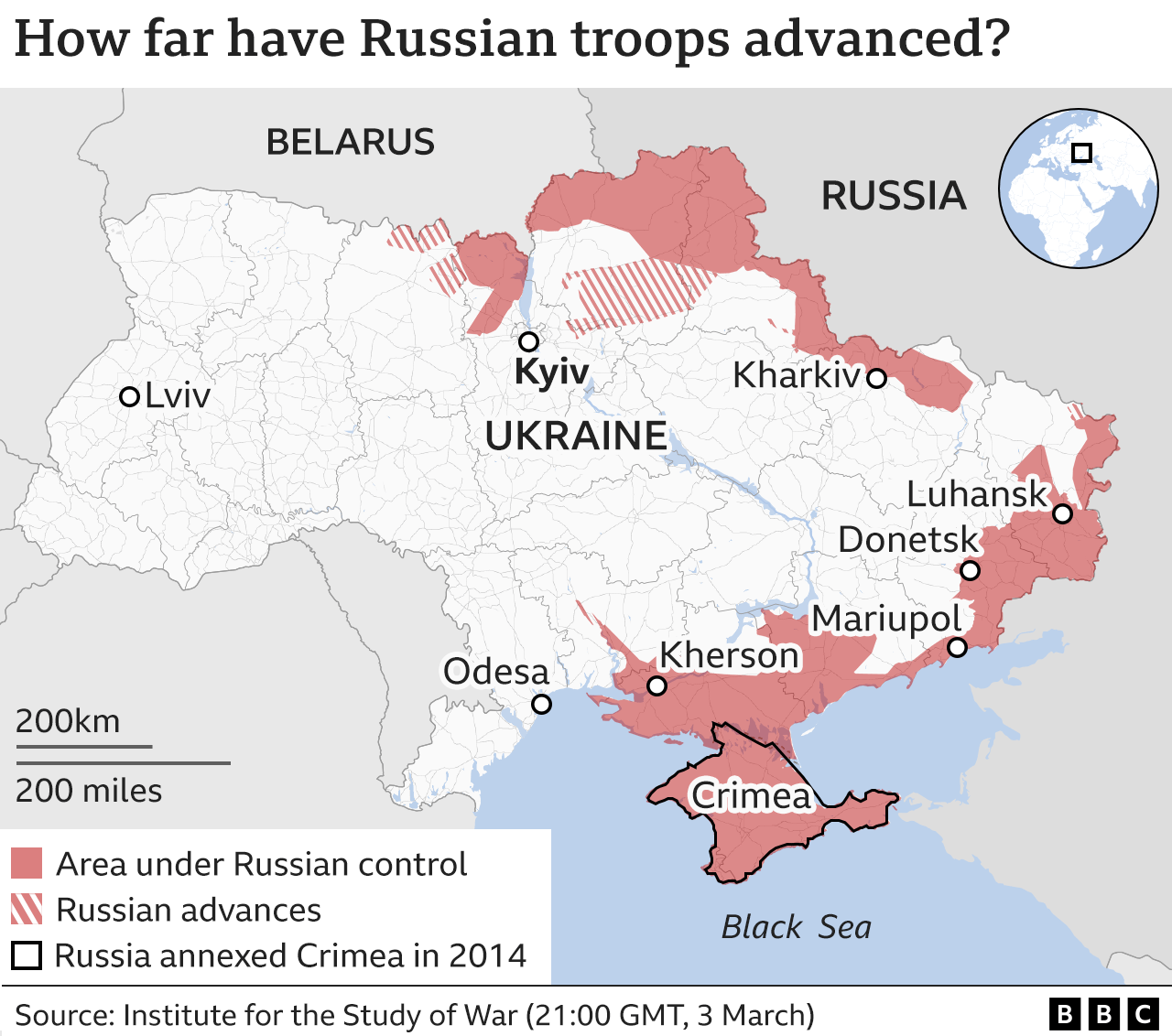
Vadim Boychenko wrote on the Telegram messaging app that the city is "simply being destroyed" and said officials are prioritising "the establishment of a ceasefire so that we can restore vital infrastructure and set up a humanitarian corridor to bring food and medicine into the city".
In Kyiv, a massive convoy stretching out over 40 miles (64km) remains stalled outside the city, but the Ukrainian capital has come under renewed assault, with explosions caused by intense shelling audible in the city centre.
There have also been unconfirmed reports of fresh fighting on Saturday in the north-eastern city of Sumy and of rocket attacks on the train station in Ukraine's second city, Kharkiv, above a metro station where city residents are sheltering from shelling, and in the northern city of Chernihiv.
And the US ambassador to the UN, Linda Thomas-Greenfield, has warned that Russian troops have advanced within 20 miles (32km) of Ukraine's second biggest nuclear facility.
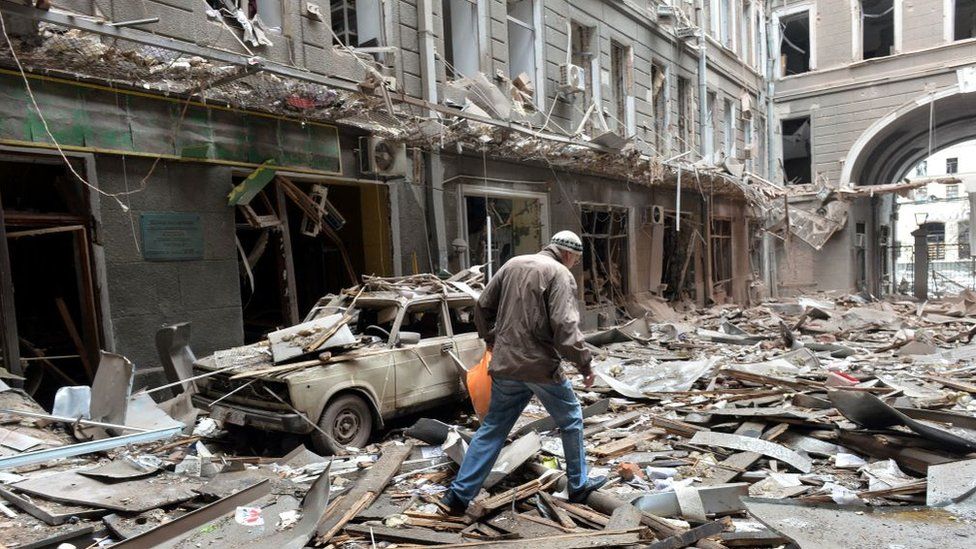
Her comments follow Friday's attack on the Zaporizhzhia nuclear power plant, which she said reflected a "dangerous new escalation" in Russia's invasion. Moscow's ambassador, Vasily Nebenzya, dismissed reports that Russian troops attacked the plant as "lies" and "disinformation".
Meanwhile in Russia, a new law signed by President Vladimir Putin that would impose prison terms of up to 15 years on people charged with spreading "fake news" about the war in Ukraine has seen several western media outlets, including the BBC, suspend operations in the country.
Tim Davie, the BBC's director-general, said the legislation "appears to criminalise the process of independent journalism" in Russia, while the Washington Post said it will remove by-lines from pieces written by its reporters in Russia.
It comes as Sky News released dramatic footage of their correspondent Stuart Ramsey coming under fire outside Kyiv.

Russia attacks Ukraine: More coverage
- LIVE: Latest updates from on the ground
- THE BASICS: Why is Putin invading Ukraine?
- SCENARIOS: Five ways the war in Ukraine might end
- INNER CIRCLE: Who's in Putin's entourage, running the war?
- IN DEPTH: Full coverage of the conflict

Meanwhile, Mr Zelensky addressed massive rallies in support of Ukraine in several cities across Europe, including the Czech capital Prague and the Georgian capital Tbilisi.
He warned demonstrators: "If Ukraine does not survive, the whole of Europe will not survive."
But in the Serbian capital of Belgrade, some 4,000 people have taken part in a pro-Russian rally that marched from a monument of Russian Tsar Nicholas II to the Russian embassy.
Demonstrators sang the Serbian and Russian national anthems and carried Russian flags and pictures of President Vladimir Putin.
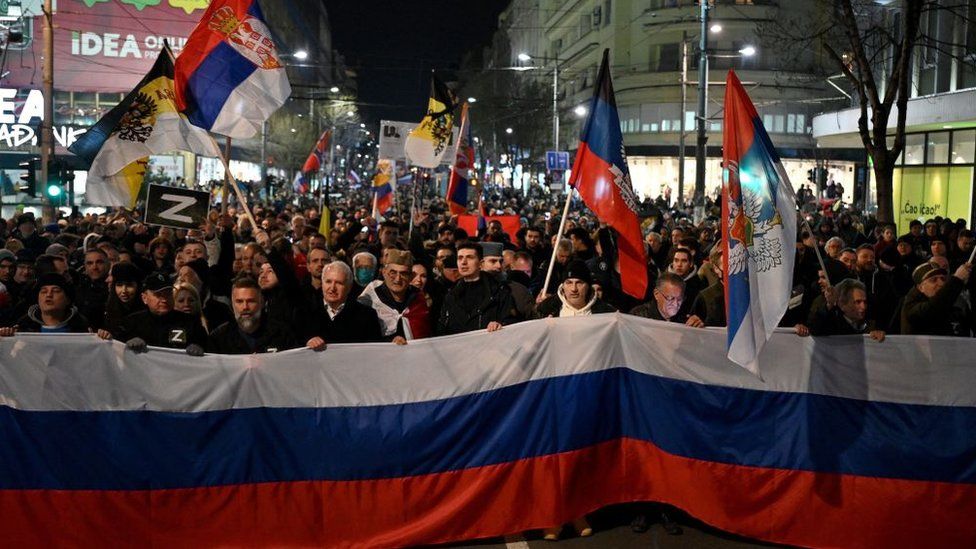
Elsewhere, in a sign that Western sanctions are starting to have a tangible impact, Italian police have seized the yachts of two of Russia's wealthiest oligarchs.
Officers seized a 213ft (65 metre) yacht worth $27m (£20m) owned by Alexey Mordashov, a close ally of President Vladimir Putin and Russia's richest man, in the northern port of Imperia, officials told local media.
Another yacht, owned by Gennady Timchenko, another oligarch with close ties to Putin, has been impounded in Imperia, officials said.
Mordashov is worth an estimated $29bn and built his wealth around the Russian steel producer Severstal, while Timchenko is said to hold around $17bn of assets and made his fortune in oil trading.


Are you in the affected region including Mariupol and Volnovakha? Share your experiences by emailing haveyoursay@bbc.co.uk.
Please include a contact number if you are willing to speak to a BBC journalist. You can also get in touch in the following ways:
- WhatsApp: +44 7756 165803
- Tweet: @BBC_HaveYourSay
- Upload pictures or video
- Please read our terms & conditions and privacy policy
If you are reading this page and can't see the form you will need to visit the mobile version of the BBC website to submit your question or comment or you can email us at HaveYourSay@bbc.co.uk. Please include your name, age and location with any submission.
https://news.google.com/__i/rss/rd/articles/CBMiMGh0dHBzOi8vd3d3LmJiYy5jby51ay9uZXdzL3dvcmxkLWV1cm9wZS02MDYyOTE3NdIBNGh0dHBzOi8vd3d3LmJiYy5jby51ay9uZXdzL3dvcmxkLWV1cm9wZS02MDYyOTE3NS5hbXA?oc=5
2022-03-05 05:28:55Z
1317846605





/cloudfront-us-east-2.images.arcpublishing.com/reuters/OCTMN62RUVO4ROTRLB2LZMVDQE.jpg)


/cloudfront-us-east-2.images.arcpublishing.com/reuters/JJILVBPRPFLMLCKVYYHIQJHCV4.jpg)